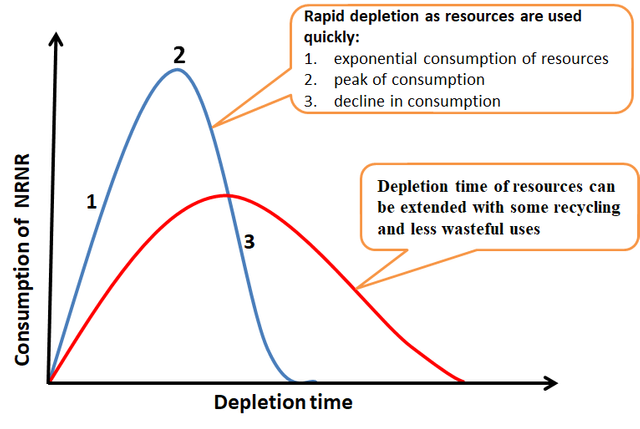Conservation of natural resources: Malthusians vs Cornucopians:

_image source: www.humandynamics.org_
Sustainable utilization of resources involves the usage of resources at a rate at which they can be replaced or recycled while preserving the long-term environmental health of the biosphere. Common practices include recycling of unwanted material, conservation, preservation of the ecosystem, and also a responsible use of the environment.
The increase in the Human population may be seen as a virtue on some grounds; however, it comes with its own repercussions. Increase population of humans has lead to the increasing consumption of resources, of which the consumption of non-renewable natural resources is of high concern. Humans have extracted and used approximately fifty percent more natural resources between 1980 and 2005 than in previous years. This raises an alarm since some of the effects of increased consumption of natural resources include damage to the environment, generations of lots of waste, as well as economic growth decline. Increase threat to natural resources has raised the issue of sustainability, and the need for conservation.
There are two noteworthy ways of thinking about the expansion in the worldwide human populace. One point of view on populace increment receives a skeptical perspective while a different perspective on human populace increment takes form in an idealistic way. These are the Malthusians and the Cornucopians, individually.
The Malthusians Point of View
The Malthusian hypothesis, motivated by Malthus, holds the view that more populace implies more mouths to feed, in this manner more resources will be needed. The resources required to fill this need won't be sufficient as resource generation cannot keep apace with populace increment. Hence, more resources would be depleted. Uncontrolled populace development may relentlessly result in ecological demolition. A definitive situation of the Malthusian hypothesis would be starvation, uncontrolled resource consumption, among others because of rivalry for limited resources. The energy requirement to exploit previously inaccessible or less concentrated resources may not be met.

- Finding new resources cannot sufficiently extend the depletion curve.
- The peak of consumption always followed by a decline; resources become more difficult to find and process.
- Technology will not overcome inevitable shortages.
Hence, Malthusians advise us to cut back on growth (population of humans- for instance, limiting the number of kids we reproduce), conserve resources, and also recycle resources when possible.
The Cornucopians View
Then again, Cornucopians are advocates with the conviction that mechanical advances can deal with the requirements of society. Populace increment is seen emphatically in light of the fact that with more populace come more intellectual competence to create thoughts. These thoughts, turn, produce advances as present-day device, techniques, frameworks, and numerous others that aid to tend to the issues related to the sustenance of people and improving individuals' personal satisfaction. Dependence on innovation heightens as the populace develops. This is by all accounts powerful in balancing the anticipated negative externalities of the geometric populace development anticipated by the Malthusian hypothesis. Humans turn out to be more specialized in their field of work and hence become progressively proficient and increasingly ready to react to issues that emerge in human undertakings. Nourishment generation has expanded extraordinarily because of current, increasingly proficient sustenance creation frameworks.

_image source: _www.leadersme.com_
Cornocupains believe that improved technology will make it possible to find new resources, exploit new reserves, substitute one mineral or energy source for another.
What do you think is the best method: the Malthusian, the Cornocupian, or Combination of the two, and why?
Hi, thanks for the post! I enjoyed reading about your summary of the Malthusican and Cornucopian philosophies towards conservation. I read Malthus' famous essay on population a number of years ago, and thought it was very insightful, although I personally lean towards the Cornucopian end of the spectrum.
I included a link to your post in my recent article, Interesting Links: June 8, 2019, and set the beneficiary so that you'll get 5% of the rewards when it closes.
That's great.